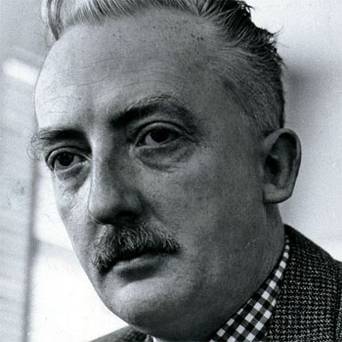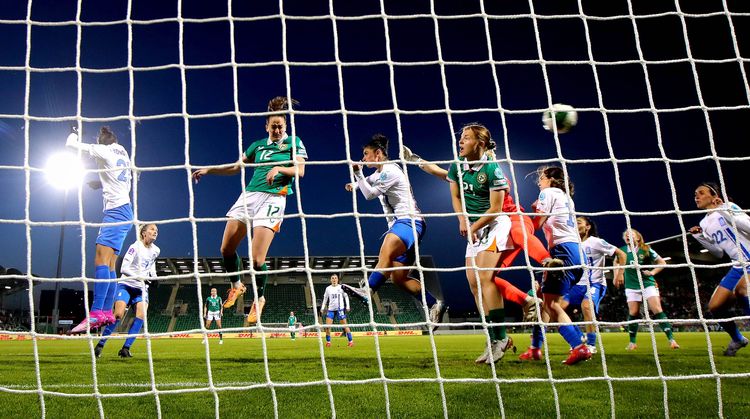Though Seán Ó Riada almost singlehandedly changed the course of Irish traditional music, few people today fully appreciate his massive legacy. The founder of the modern school of Irish folk music, Ó Riada became the driving force in the revival of Irish traditional music in the 1960s. A composer, performer, arranger, broadcaster and lecturer, he also combined traditional and modern techniques to create a new sound, and Irish traditional music owes him a massive debt. He helped revive the bodhrán, which had almost disappeared from traditional music, and integrated it into traditional music as a form of percussion. Some claim his most enduring achievement was forming the traditional music ensemble Ceoltóirí Chualann, which laid the groundwork for the Chieftains, perhaps the most popular traditional Irish band ever.
Ó Riada produced three full-length documentaries, two narrative films and numerous newsreel items and TV documentaries. He also composed some of the most iconic Irish film scores of all times including “Mise Eire,” “The Playboy of the Western World” and “Barry Lyndon.” Renowned Irish poets Seamus Heaney, Thomas Kinsella and John Montague dedicated verses in his honor, and he amazingly achieved all this before dying prematurely at age 40.
Born as John Reidy in Cork in 1931, Ó Riada came from a musical family. His father Seán from Kilmihil, Co. Clare, studied fiddle with Patrick Kelly of Cree and his mother Julia Creedon, from Kilnamartra, Co. Cork, played concertina and melodeon. His father served as a Garda sargeant in Adare, Co. Limerick, where young Seán started school and developed a passion for the Irish language thanks to his first teacher, a Brother Long from Dingle, Co. Kerry. He began violin at age seven and piano the following year.
Returning to Cork, he attended St. Finbarr’s College where he studied under German choirmaster, organist and composer Aloys Georg Fleischmann who would teach O’Riada many of the formal elements of classical music. In 1948, Ó Riada won a scholarship to University College Cork where studied music and arts as well as three languages, Greek Latin and Gaelic, graduating with honors. He married Ruth Coughlan in 1953 and was appointed assistant director of music at Radio Eireann. Two years later, hoping to gain fame as a composer of modern music, he resigned from Radio Eireann and headed to Paris where he led the life of a bohemian, played jazz and met the avant garde composer Olivier Messiaen, who at that time was teaching at the Conservatoire de Paris. Ó Riada composed several Avant Garde compositions for orchestra called Nomos, but just as he was about to become Ireland’s first Avant Garde composer, he experienced a radical transformation and rekindled a fascination with Irish music. He decided to leave France, famously saying, “I’d rather be breaking stones in Ireland than be the richest man living in Europe.” Returning to Dublin, he was appointed musical director of the Abbey Theater. His passion for traditional Irish folk music, however, was not widely shared amongst many of the educated and upper classes who often looked down on it. Ó Riada’s first attempts to infuse Irish vernacular music into European musical culture began in 1959. The following year he composed the score for the documentary “Mise Éire" and “Saoirse “in 1960 and, most famously, the score for the film version of “The Playboy of the Western World “in 1963, which made him a household name in Ireland. He also composed music for the poem “Mná na h’Éireann” (“The Women of Ireland”) which many artists have since covered.
He also produced a series for RTÉ called Our Musical Heritage. On his broadcasts Ó Riada explained the nature of Irish music to the nation and both how it differed from the music of other nations and reflected the culture of the Irish people. He became a kind of Irish Alan Lomax, scouring Ireland for performers whom he could present to the nation. In West Kerry he discovered Sean-nos singing of traditional Irish ballads, whose haunting beauty would leave a lasting effect on Irish music. Ó Riada would become the first composer to translate sean-nós melodies into orchestral pieces.
Ó Riada also began to experiment with combinations of musicians that evolved into the Ceoltoiri Chualann. Ó Riada felt ceilì bands did not fully capture the beauty and majesty of traditional Irish music and he revolutionized the way Irish music was played by creating a type of “folk orchestra.” He met twenty-year-old Paddy Maloney, a brilliant piper and bodhran player and Ó Riada immediately recognized Maloney could help him develop this new orchestral style of playing traditional music. Ó Riada invited Paddy to arrange music interweaving melodies and classical-style harmonies into a play, “The Golden Folk,” at Dublin’s Abbey Theatre. Deciding to form a band with Maloney, Ó Riada invited Sean Potts to play on tin whistle, Michael Tubridy on flute along with Abbey resident violin player Martin Faye and Props manager Ronnie McShane on percussion. Their first formal appearance as a stage group was at the Shelbourne Hotel in Dublin, which marked the first formal recital of Irish traditional music and created a new musical template that all genres of Irish music have followed since. Although they played in concert halls dressed like traditional Irish showbands in a black suits, white shirts and black bow ties, they shocked and delighted their audiences who had never heard traditional tunes played as orchestral pieces. They also reintroduced 18th century harp music, such as O’ Carolan’s songs, to the traditional repertoire. The group transformed Traditional music and made several revolutionary albums including "Riada sa Gaiety"(Gael Linn) in 1969 before disbanding in 1970.
In 1962, Ó Riada recorded a song for fun in Gaelic, “An Poc ar Buile,” together with friends composer Dónall Ó Mulláin and tenor Seán Ó Sé. The friends took turns singing the verses and joined together for the song’s rousing chorus “ailliliú, puilliliú.” Much to Ó Riada’s great surprise, the song became an overnight hit and today it is considered to be first Irish language pop hit.
In 1963, he was named assistant lecturer of music at University College Cork, becoming Ireland’s first lecturer in traditional music. The appointment allowed him to move his family to the West Cork Gaeltacht of Cuil Aodha, 10 miles from where his mother was born. He became deeply involved in this Irish speaking community and Ó Riada and his wife Ruth drank regularly at a pub which still advertises itself as being his local. He founded Cór Chúil Aodha there, a male voice choir and started composing unadorned, but haunting Gaelic liturgical music, including A”ifreann 2,” to be sung by untrained voices in his choir. His keen interest in liturgical music led him to write a further two other Masses, Glenstall and an Irish Government commissioned Requiem. His movement from Dublin led to controversy with Paddy Maloney who, unlike Ó Riada, wished to continue touring with Ceoltóirí Chualann. The disagreement led Maloney to form the Chieftains who used all Ó Riada’s discoveries and inventions as well as many of the tunes Ó Riada revived on their debut album in 1963.
Ó Riada suffered from genetic liver problems aggravated by heavy drinking. He died of cirrhosis of the liver in 1971 aged forty. The entire Irish musical community mourned his passing. The finest traditional musicians in Ireland played at his funeral including Willie Clancy, accordionist Tony McMahon and the members of Ceoltóirí Chualann.
Though he had lived a short life, Ó Riada left a massive legacy, transforming Irish traditional music. His son Peader said that Ó Riada’s real genius, was that his refusal to intellectualize traditional music. “Seán was fearless,” Peadar said. “He didn’t care what others thought about what he did, because you don’t when you’re riding that horse. You don’t worry about falling off. The exhilaration and emotion of the act demand all your attention.”
His son continued, "He had a huge interest in what is now called world music and wanted to see a fusion of the arts and, in particular, of music and poetry."
Antoine Ó Coileáin of Gael Linn, on whose label most of Ó Riada's traditional-music recordings were released, summed up his legacy, "I really think he saw into the soul of what the Irish psyche is.” In a way what we witness today as the thriving state of Irish music is due in very large part to the influence of Ó Riada. He dug deep into the roots of what makes us Irish and inspired tremendous confidence in ourselves. He achieved so much in his short life. He was very much ahead of his time.”









